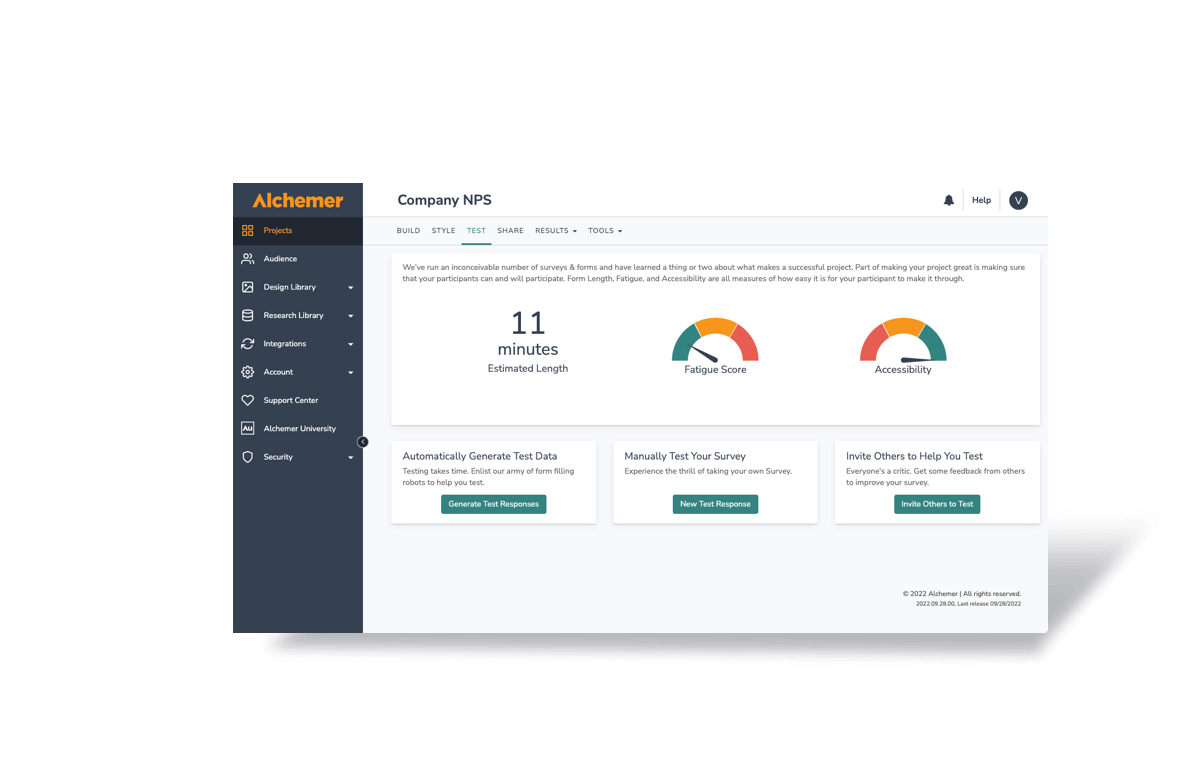
Alchemer offers a platform that allows you to make online questionnaires quickly and easily. Our questionnaire software gathers and analyzes feedback from any source, lets you incorporate the collected data into your current business processes and applications, and consolidates the feedback to help you come up with solutions using the gathered information. Many top brands, such as Mozilla and Dish Networks, use our platform to make informed decisions and improve their organizational processes.
The great thing about administering online questionnaires is that they’re a simple and effective way to collect information. Since respondents answer the same set of questions, comparing the results is easy. Designing an online survey questionnaire, however, is both an art and a science. You need to know the right questions to ask, as well as how to phrase it properly. By doing so, you obtain only accurate, useful, and relevant results.
Here are a few tips for formulating a valid questionnaire:
Determine your goals
Ask yourself this question: What are you trying to accomplish? From there, develop questions that are in line with your goals.
Keep your questionnaire as short as possible
Complicated or lengthy questionnaires may result in responder fatigue. When your respondents get tired of answering, they will likely rush through the questionnaire just to complete the task or abandon the whole thing altogether.
Either outcome is detrimental to the quality of the results. Dropouts, for instance, can cause sampling bias, a researcher error where the subset population fails to represent the entire target population properly. On the other hand, rushed responses will likely produce inaccurate results.
Keeping the questionnaire short avoids both outcomes. If you prepared questions that you don’t have an answer to, omit them from the set.
Pilot your research questions first
Before sending off your questionnaire to hundreds or thousands of people, test the questions on a few individuals. Piloting your questions helps you unearth any ambiguous or unclear words or phrases in your questionnaire.
Do not use acronyms and jargon
While specific terminologies may be common knowledge in your industry, avoid assuming that your respondents are aware of them. If you have to use a potentially unfamiliar term or an acronym to get the point across, spell it out entirely, and explain it in non-technical language. If your topic, for instance, revolves around the use of genetically modified organisms (GMOs), give details on any complicated terminology mentioned in the questionnaire.
Do not include absolutes when designing your questions
Questions with wordings, such as never, always, and all, may force respondents to a corner and provide less useful feedback. Here’s an example: Instead of writing, “Do you always exercise?” consider asking, “How many times do you exercise in a week?” Alternatively, just drop the word “always,” and you’re good to go.
Do not write double-barreled questions
This questionnaire design error asks respondents two questions in one statement. Getting accurate responses to double-barreled questions is impossible, as subjects may choose options that answer just one of the questions. A few examples of double-barreled statements are:
• How happy are you with your boss and career?
• Is this particular equipment useful and affordable?
• Do you believe that the government should invest more of its money on education and less on military defenses?
You can avoid double-barreled questions by conducting quality checks on your questionnaire, phrasing your statements properly, and keeping a close eye on conjunctions, such as “or” and “and.”
FAQs on Questionnaires
Here are a few questions people usually ask about online questionnaires:
What is the difference between a questionnaire and a survey?
Although people may find these terms to be interchangeable, they are different from each other. A questionnaire is a research method used to gather data through a set of questions. A survey, on the other hand, is a data collection method that may utilize a questionnaire to analyze statistics or look for particular behavior or trends.
What are the benefits of an online questionnaire?
An online questionnaire makes collecting data more automated, as users can submit the responses to questions through online questionnaire software. Additionally, making online questionnaires is more convenient than other research methods. Face-to-face interviews, for instance, require you to meet up with your interviewee. Meet-ups are not required in questionnaires.
What are the common types of questionnaires?
• Dichotomous – The questions are answerable by a “Yes” or “No.”
• Multiple Choice – Respondents can choose from a set of answers.
• Scaling – Subjects can rate a statement on a particular set of values, such as from Strongly Agree to Strongly Disagree, and from one to five.
How do you format a questionnaire effectively?
• Use a typeface that is easy to read. Avoid tacky fonts.
• Guide your respondents throughout the answering process by numbering your questions correctly.
• Display only one question at a time. Don’t overwhelm the respondent by showing multiple questions on a single screen.
Why Choose Alchemer
Here are great reasons to pick us over other online questionnaire makers:
No Limit to the Number of Responses You Receive
You can collect as many responses as you need, with no additional fees. If you suddenly need to survey 10,000 or more employees, the cost is the same as surveying 100.
No Limit to the Number of Questions
You can ask as many questions as you want without worrying about additional fees or hidden charges.
Over 40 Built-in Question Types
Whether your questionnaire requires multiple-choice, Likert Scale, or any other question type, you can create customized questions to get the data you need.
Beneficial to Various Industries
Our online questionnaire platform helps organizations in various sectors enhance their processes. These industries include:
• Non-Profits – Leverage our online software to collect data from donors and volunteers. The information you gather can help you streamline your non-profit organization.
• Health Care – Our online questionnaire lets you collect pertinent data from patients, such as ratings for doctors and patient experience, to improve your health care facility.
• Education – Create a web-based questionnaire to gather data from students and teachers. You may use the information to address the needs of the university or school.

By accessing and using this page, you agree to the Terms of Use . Your information will never be shared.